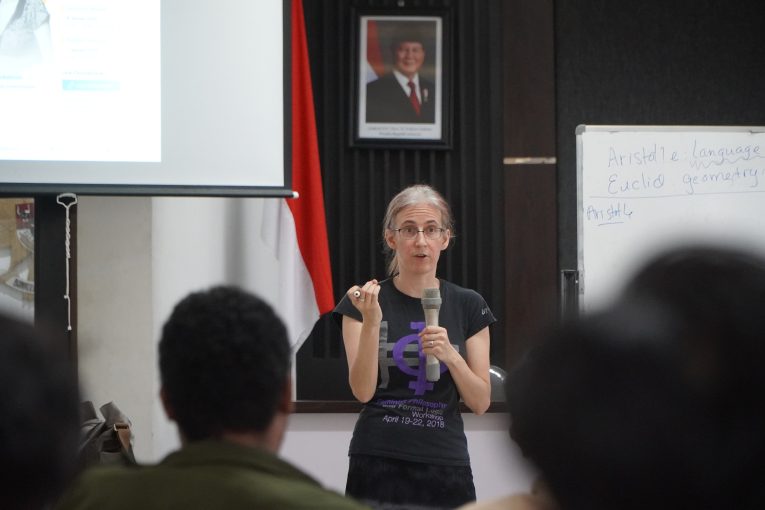
January 14 is recognized as World Logic Day, an observance established by the United Nations Educational, Scientific, and Cultural Organization (UNESCO). To mark the occasion, the Faculty of Philosophy at Universitas Gadjah Mada (UGM) hosted a lecture series featuring Dr. Sara L. Uckerman from Durham University, United Kingdom, as the keynote speaker.
The lecture series commenced yesterday (7/1) with two sessions that explored fundamental and methodological aspects of logic studies. The first session, titled “History of Logic,” delved into the historical development of logic, covering its definitions, significant periods, and key figures in the discipline. The second session, “Fiction Writing as Philosophical Methodology,” examined how fiction writing can serve as an effective methodological tool for exploring and conveying philosophical arguments.
During the first session, Dr. Uckerman remarked, “The definition of logic that I like to use is that logic is the study of good arguments. We are interested in arguments that have premises and solutions. An argument is a list of statements, some of which are premises, and one of which is a conclusion. It is quite clear that you can include anything in this list of statements.”
She also highlighted Aristotle’s contributions to establishing logic as a specific discipline. According to her, Aristotle’s syllogistic system was developed within the context of scientific reasoning to ensure that if one begins with true premises, the conclusions derived would also be true. Dr. Uckerman emphasized that Aristotle’s framework for logic was specifically intended for scientific discovery, rather than general usage.
The session provided an in-depth exploration of pivotal periods in the history of logic, ranging from Ancient Greece with Aristotle, through the medieval tradition of logic, to the transformative era of modern logic. Dr. Uckerman explained how each period laid the foundation for today’s understanding of logic, highlighting differences in their approaches to arguments and truth.
Participants showed great enthusiasm throughout the session, as evidenced by the numerous questions posed during the Q&A segment. Several attendees requested literature recommendations for further study on the history of logic and comparisons between the different historical periods.
The first day of the lecture series was attended by dozens of students, not only from the Faculty of Philosophy and other faculties at UGM but also from various other universities such as Yogyakarta State University, Nahdlatul Ulama University (UNU) Yogyakarta, Ahmad Dahlan University, and others. The sessions were also live-streamed via the official YouTube channel of the Faculty of Philosophy, extending the reach of the event to a broader audience, including academics and the general public with an interest in logic studies.
The event will conclude with a Public Lecture titled “Why Logic Matters” on January 7, 2025. This session aims to provide insights into the relevance of logic across various aspects of modern life, from scientific thinking and decision-making to ethics.
